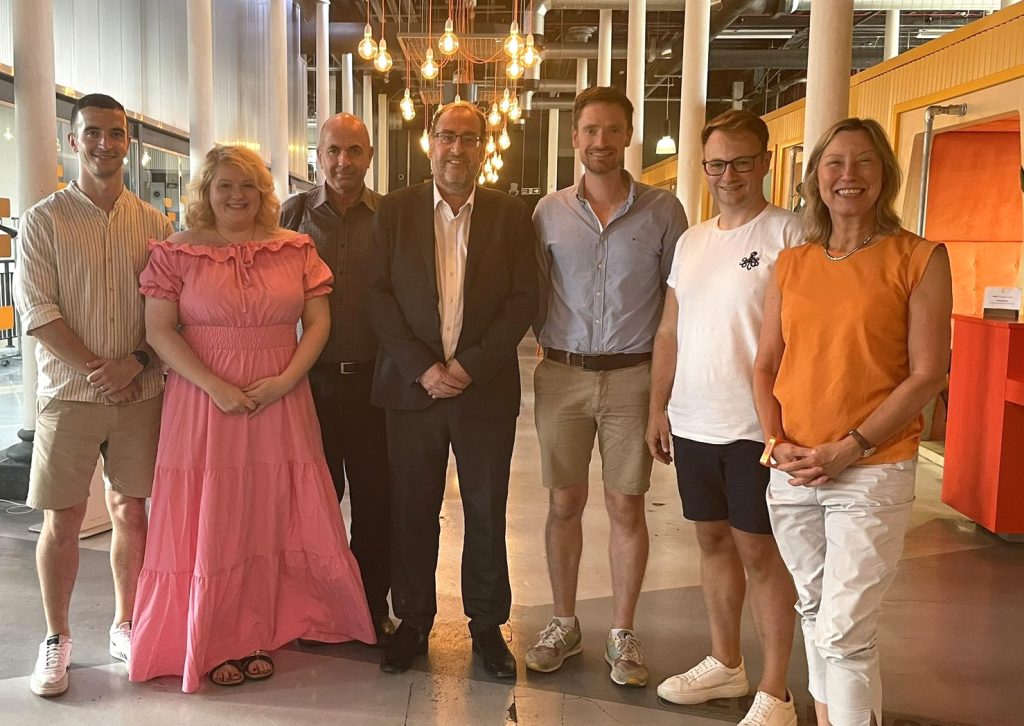
Cllr Dyer met with Mike Paton (Engine Shed/Quantum Technologies Innovation Centre), Kimberley Brook (SETsquared Bristol), Jack Stanbury (Future Finance), Ben Shorrock (techSPARK) and Tamsin Denbigh (Bristol Innovations).
Engine Shed has a long history of working with Bristol City Council. The innovation hub started in 2013 as an experimental partnership between Bristol City Council and the University of Bristol to stimulate economic activity in the region, and is now the model for innovation hubs the world over.
At the visit, key discussion points included:
Unlocking inward investment in the South West
Cllr Dyer cited positive early signals from the new UK Government towards inward investment for Bristol and other large cities outside of London and acknowedged that flow of capital was key to support the survival rate of startups in Bristol.
“Bristol is an innovative city, and we are in the top end for startups, by providing the right support we can help more to succeed”. – Cllr Tony Dyer
techSPARK and Engine Shed referenced the work of the Investment Activator Programme to support founders raising investment, and Meet the Funder events, in partnership with British Business Bank, to advise founders on what investors want to know and hear.
Importance of regional and city collaborations
Cllr Dyer talked about the importance for Bristol of collaborations with other UK cities, particularly with Wales and the West of England.
SETsquared Bristol commented on its connections with the five other centres across the South of England that make up the SETsquared Partnership – Bath, Cardiff, Exeter, Southampton and Surrey.
Future Finance, funded by UKRI, works with regions across the UK to overcome market failures that are holding back innovation uptake in the financial services’ sector, levelling benefits and promoting equitable access to financial services for underserved groups.
“Challenge-based innovation, where user communities are involved in defining the challenge to be addressed, is a great way of maximizing the impact and inclusivity of innovation. Future Finance is a sound blueprint for our future activity in other sectors.” – Mike Paton
Bristol, already established as the home for commercialising quantum, has connections with regional quantum hubs and industry across the UK. The University of Bristol’s Quantum Technologies Innovation Centre has close relations with Newport’s Compound Semiconductor Catapult, and the University of Cardiff through their quantum and semiconductor hub, QLAB.
Bringing organisations together and widening outreach
Alongside the One City Plan, which looks to bring organisations together to work with the Council, Cllr Dyer discussed how he is keen to break down the barriers and create more ‘serendipitous opportunities’ for businesses to talk to Bristol City Council and government. He referenced that the city now has 3 MPs with ministerial positions which will provide more opportunity to influence at national level.
Initiatives were also discussed to support communities that don’t have access to innovation resources.
techSPARK referenced START, a programme fully funded by the West of England Mayoral Combined Authority and delivered in partnership with the four Bath & Bristol universities, which provides business support for technology-based businesses. It has supported 130 businesses to date and uses inclusive and equitable recruitment processes and programme design.
Cllr Dyer referenced the work of the charity Knowle West Media Centre for its skills training for young people from different background and its maker spaces.
“There is lots of potential for community initiatives which combine new tech with old skills. We’d love to have maker spaces in every area in the Bristol region.” – Cllr Dyer
Bristol Technology Festival is another example of bringing organisations together and widening outreach. Now in its sixth year of running, last year the festival had a reach of just under 50 million with its week-long model of crowdsourced events and promotion.